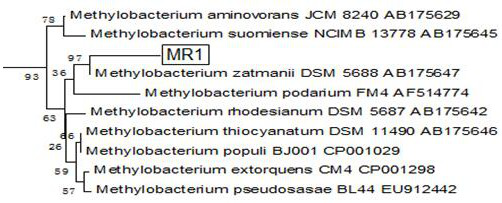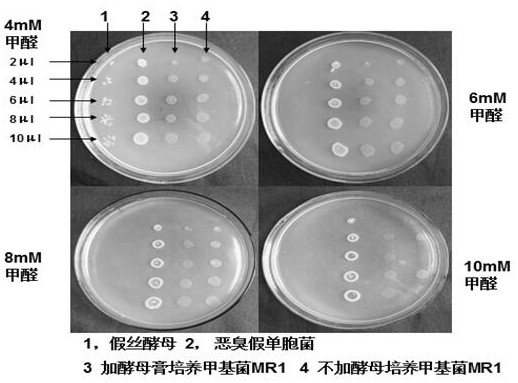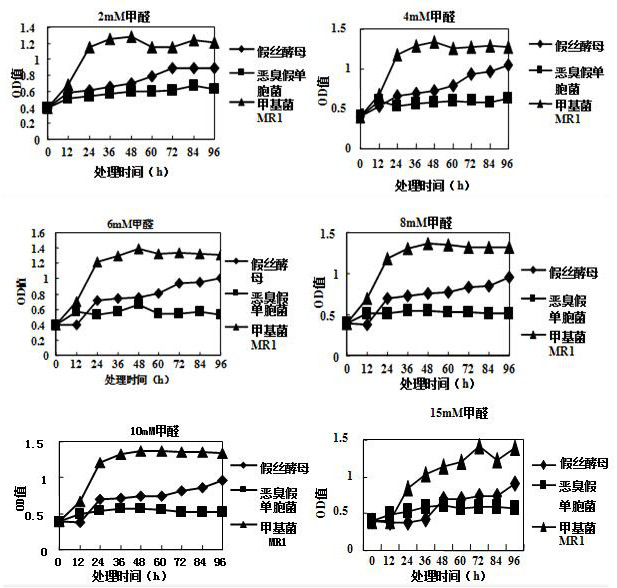A Novel Methylobacter mr1 and Its Application
A new type of methyl bacteria, applied in the field of environmental microorganisms, can solve the problems of complex components and unclear composition of activated sludge
- Summary
- Abstract
- Description
- Claims
- Application Information
AI Technical Summary
Problems solved by technology
Method used
Image
Examples
Embodiment 1
[0028] Example 1 Screening, Identification and Detection of Bacterial Strains
[0029]In order to overcome the defects of the prior art, the present invention at first embeds the activated sludge collected in the river course with alginate and sponge, utilizes the air polluted with high concentration of formaldehyde to domesticate the microorganisms in the activated sludge, and then utilizes the inorganic salt of methylobacteria The culture medium is used to isolate methylobacteria that grow fast and are highly resistant to formaldehyde. The specific screening steps are:
[0030] 1. Encapsulation of activated sludge and domestication of microorganisms
[0031] Collect the sludge from the river and mix it with water, filter it with gauze to remove large particles such as gravel, then mix it with 2% sodium alginate (1:1), soak the sponge and remove the excess liquid mixture, and then put it in 4 %CaCl 2 Solidified embedding in solution. Roll the sponge embedding sludge into a...
Embodiment 2
[0036] Example 2 Analysis of the resistance of MR1 to formaldehyde, the effect of removing formaldehyde and the pathway of metabolic conversion of formaldehyde
[0037] 1. Analysis of the resistance of MR1 to formaldehyde
[0038] Add 4 mM, 8 mM, 12 mM and 20 mM formaldehyde to the solid medium with and without yeast extract, and inoculate 1% (v / v) of MR1 bacterial solution into the liquid culture medium containing 5 mM methanol and yeast extract culture medium at 28°C on a shaking table, and when the OD600 reached 0.5, 1 μl, 2 μl, 3 μl, 4 μl, 5 μl, 6 μl, 7 μl, 8 μl, and 9 μl of bacterial liquid were spotted on solid media containing different concentrations of formaldehyde, and warmed at 28°C. After culturing in the box for 48 hours, observe its growth status. The results showed that there was no significant difference in the growth status of strain MR1 in the inorganic medium with and without yeast extract, indicating that the growth of MR1 was not dependent on yeast extrac...
Embodiment 3
[0047] Example 3 Analysis of MR1's tolerance to benzene series and other organic pollutants and the effect of removing benzene series
[0048] 1. Analysis of tolerance of MR1 to benzene series and other organic pollutants
[0049] Add concentrations of 4 mM, 8 mM, 12 mM and 20 mM ethanol, isopropanol, xylene, benzene, and toluene to solid medium containing 5 mM methanol to make plates. Take 1 μl, 2 μl, 3 μl, 4 μl, 5 μl, 6 μl, 7 μl, 8 μl, 9 μl of MR1 bacterial solution with an OD600 of 0.5 and spot it on a solid plate, culture it in a 28°C incubator for 48 hours, and observe its growth status. The results show that the presence of acetaldehyde, ethanol, and isopropanol has no significant effect on the growth of the MR1 strain. Its tolerance to acetaldehyde, ethanol, and isopropanol can reach 20mM, but the growth status on the plate containing isopropanol poor. It can grow on the plate added with xylene, benzene, and toluene, and the resistance to xylene, benzene, and toluene ...
PUM
 Login to View More
Login to View More Abstract
Description
Claims
Application Information
 Login to View More
Login to View More - R&D
- Intellectual Property
- Life Sciences
- Materials
- Tech Scout
- Unparalleled Data Quality
- Higher Quality Content
- 60% Fewer Hallucinations
Browse by: Latest US Patents, China's latest patents, Technical Efficacy Thesaurus, Application Domain, Technology Topic, Popular Technical Reports.
© 2025 PatSnap. All rights reserved.Legal|Privacy policy|Modern Slavery Act Transparency Statement|Sitemap|About US| Contact US: help@patsnap.com



